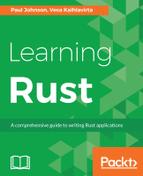The problem with the third option is that, when we call within the library, we either have a return type of tuple(bool, f32) or f32. Therefore, in a function that only returns a single type, we will need to set calc_completed to true.
It is possible to set a default value on the struct by deriving or implementing std::Default (we will cover the standard library in Chapter 13, The Standard Library, and Chapter 14, Foreign Function Interfaces). Here's a derived version:
#[derive(Default)]
pub struct MathsAnswers {
calc_complete : bool,
fanswer : f32,
ianswer : i32,
}
All primitive types in Rust have a sensible default value: numbers are zeroes, bool is false, Strings are empty strings, and so on. The preceding code is equivalent to the following manually implemented Default :
impl Default for MathsAnswers {
fn default () -> MathsAnswers {
MathsAnswers {calc_complete: false, fanswer: 0f32, ianswer: 0i32 }
}
}
However, we want the calc_complete default to be true, so we'll use this implementation instead:
impl Default for MathsAnswers {
fn default () -> MathsAnswers {
MathsAnswers {calc_complete: false, fanswer: 0f32, ianswer: 0i32 }
}
}
After the Default implementation, we may choose to only fill in some of the values when creating an instance and supply Default::default() for the rest:
// do calculation then
let answers = MathsAnswers { fanswer: calc_ans, ..Default::default() }; return MathsAnswers;
The potential problem is where to put the struct in terms of scope. Where would it be best to place it?
